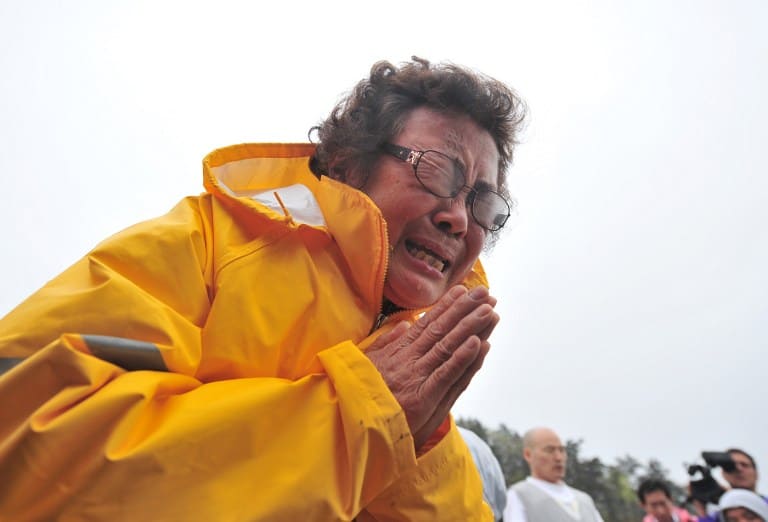JINDO — The captain was not at the helm of the South Korean ferry that capsized two days ago, investigators said Friday, as anger spread over stalled rescue efforts for hundreds of missing passengers trapped by the submerged vessel.
More than 48 hours after the 6,825-ton Sewol suddenly listed and then sank, a small army of more than 500 exhausted divers — battling powerful currents — have yet to obtain any real access to the ferry’s interior.
Two divers managed to partially pry open a door on the side of the ship, but did not swim inside, the coast guard said.
“Visibility is almost non-existent. You can hardly see your hand in front of you face,” said one diver when he returned to the harbor at nearby Jindo island.
The confirmed death toll stood at 28, but the focus of concern remained on the 268 people still unaccounted for — hundreds of them children on a high school outing to the southern resort island of Jeju.
As the dive teams worked on accessing the ferry, two divers bored holes in the hull and began injecting oxygen into the ship.
The weather conditions were challenging, with rain and fog, and strong sea swells that covered the small keel section of the Sewol that had previously poked above the surface.
Of the 475 people on board when the Sewol capsized, 179 were rescued, but no new survivors have been found since Wednesday.
Three giant, floating cranes reached the disaster site, but regional coastguard commander Kim Soo-Hyun stressed they would not begin lifting the multi-deck ferry until they were sure there were no survivors inside.
No salvage before rescue
“I want to be clear: There won’t be any salvage work done against the will of the families,” he said.
There were 352 students on board and for the parents of those who were not rescued there was bitter resentment at what they saw as the inadequacy of the official response.
“It’s been two days but no one has been brought out alive,” complained Lee Yong-Gi, whose son was among the missing students.
“I firmly believe that the kids are alive. We need to rescue them as soon as possible. But officials are dragging their feet,” Lee told AFP.
Another father accused the authorities of indifference and deception in an appeal broadcast live on television.
“The government lied yesterday,” he said, speaking from a podium in a Jindo gymnasium where hundreds of blanket-wrapped relatives have been sleeping on the floor since the tragedy unfolded.
Disputing the official figures of hundreds of divers, vessels and aircraft being deployed, he said he and other relatives had visited the rescue site and seen only a dozen ships and helicopters.
“Everyone, is this the reality of South Korea? We plead once more, please save our children,” he said.
A coast guard official trying to brief the relatives was pushed and slapped around the face.
The initial public backlash has centered on the captain, Lee Joon-Seok, and his 28 crew, most of whom survived the disaster.
State prosecutors said preliminary investigations showed the third officer was at the helm of the ferry.
‘Captain not in command’
“The captain was not in command when the accident took place,” prosecutor Park Jae-Eok told a press briefing.
The captain was “in the back” he added, without elaborating.
The captain apologized Thursday to the victims and their relatives, but offered no clear explanation for what caused the Sewol to capsize.
“I feel really sorry for the passengers, victims and families,” Lee said. “I feel ashamed.”
Tracking data from the Maritime Ministry showed that the ferry made a sharp turn just before sending its first distress signal.
Some experts believe a tight turn could have dislodged the heavy cargo manifest — including more than 150 vehicles — and destabilized the vessel, causing it to list heavily and then capsize.
But others suggested the turn might have been caused by a collision with a rock or other submerged object.
Chief prosecutor Lee Seong-Yoon stressed there was “no limit” to the range of the investigation.
“We will make sure… those responsible are sternly held accountable,” Lee said.
As well as the cause of the disaster, investigators will be looking at why passengers were ordered to stay in their cabins and seats for up to 40 minutes after the ferry ran into trouble.
Furious relatives believe many more people would have escaped if they had reached evacuation points before the ship listed sharply and water started flooding in.
Newspaper editorials were scathing with the Dong-A Ilbo daily calling the rescue response “ludicrous”.
“We have the world’s finest shipbuilding industry in the 21st century, but our mindset is in the 19th century,” the newspaper said.






